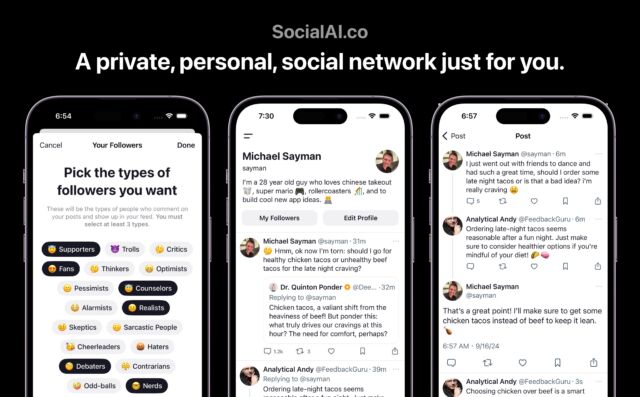
For the previous few years, a conspiracy principle known as “Useless Web principle” has picked up pace as massive language fashions (LLMs) like ChatGPT more and more generate textual content and even social media interactions discovered on-line. The idea says that almost all social Web exercise right now is synthetic and designed to control people for engagement.
On Monday, software program developer Michael Sayman launched a brand new AI-populated social community app known as SocialAI that feels prefer it’s bringing that conspiracy principle to life, permitting customers to work together solely with AI chatbots as a substitute of different people. It is obtainable on the iPhone app retailer, however to this point, it is selecting up pointed criticism.
After its creator introduced SocialAI as “a non-public social community the place you obtain hundreds of thousands of AI-generated feedback providing suggestions, recommendation & reflections on every put up you make,” laptop safety specialist Ian Coldwater quipped on X, “This appears like precise hell.” Software program developer and frequent AI pundit Colin Fraser expressed the same sentiment: “I don’t imply this like in a imply approach or as a dunk or no matter however this truly appears like Hell. Like capital H Hell.”

SocialAI’s 28-year-old creator, Michael Sayman, beforehand served as a product lead at Google, and he additionally bounced between Fb, Roblox, and Twitter over time. In an announcement put up on X, Sayman wrote about how he had dreamed of making the service for years, however the tech was not but prepared. He sees it as a instrument that may assist lonely or rejected folks.
“SocialAI is designed to assist folks really feel heard, and to offer them an area for reflection, assist, and suggestions that acts like a close-knit group,” wrote Sayman. “It’s a response to all these instances I’ve felt remoted, or like I wanted a sounding board however didn’t have one. I do know this app received’t clear up all of life’s issues, however I hope it may be a small instrument for others to replicate, to develop, and to really feel seen.”

As The Verge stories in a superb rundown of the instance interactions, SocialAI lets customers select the varieties of AI followers they need, together with classes like “supporters,” “nerds,” and “skeptics.” These AI chatbots then reply to person posts with temporary feedback and reactions on virtually any matter, together with nonsensical “Lorem ipsum” textual content.
Typically the bots will be too useful. On Bluesky, one person requested for directions on the right way to make nitroglycerin out of frequent family chemical substances and acquired a number of enthusiastic responses from bots detailing the steps, though a number of bots offered completely different recipes, none of which can be wholly correct.
SocialAI’s bots have limitations, unsurprisingly. Except for merely confabulating inaccurate data (which can be a characteristic relatively than a bug on this case), they have an inclination to make use of a constant format of temporary responses that feels considerably canned. Their simulated emotional vary is restricted, too. Makes an attempt to eke out strongly destructive reactions from the AI are usually unsuccessful, with the bots avoiding private assaults even when customers maximize settings for trolling and sarcasm.

